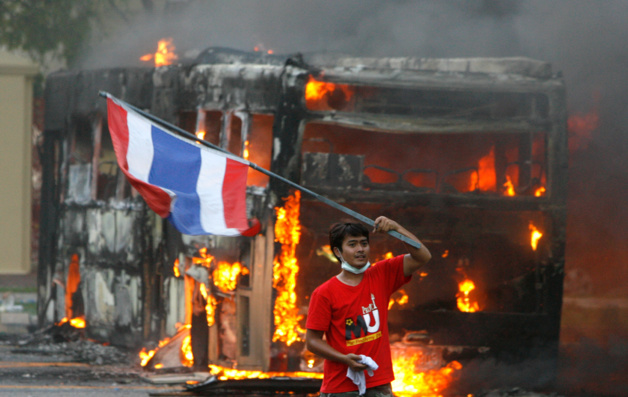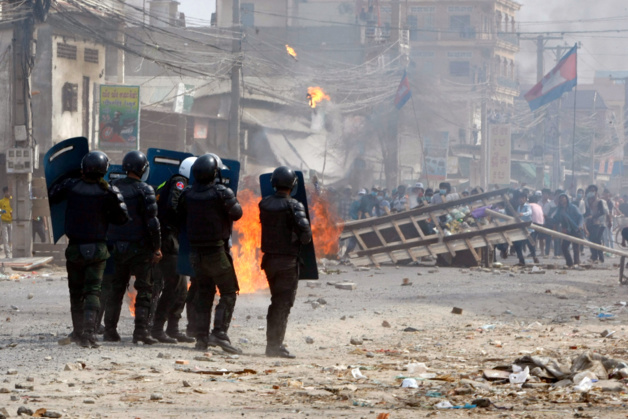While protests have flourished here and there for several months in Southeast Asia, certain newspapers representing the opposition, namely in Thailand, have taken a risk by alluding to an imminent “Arab Spring” in the region in the hopes of giving impetus to move towards a more generalized and radical form of protest. With the ubiquity of this exaggeration, is an Asian “Arab Spring” even relevant?
There were the repeated explosions in Myanmar in October, rebellion in a neighbourhood of Singapore in November; thousands of protesters took to the streets of Bangkok in December, and a semblance of civil war that left four dead in Phnom Penh broke out in January. The series of protests seem incessant in this region where democracy is still somewhat of a grey area. It would be much too easy and unjustified to make such a quick comparison, when looking at the facts, between the Arab Spring of 2010 and the current events that are stirring up public order in Southeast Asia.
There were the repeated explosions in Myanmar in October, rebellion in a neighbourhood of Singapore in November; thousands of protesters took to the streets of Bangkok in December, and a semblance of civil war that left four dead in Phnom Penh broke out in January. The series of protests seem incessant in this region where democracy is still somewhat of a grey area. It would be much too easy and unjustified to make such a quick comparison, when looking at the facts, between the Arab Spring of 2010 and the current events that are stirring up public order in Southeast Asia.
Protests of a different kind
Whereas the regimes in place in Tunisia, Egypt, and Libya were tried and true dictatorships, here they are more democratic. Yet not ideal democracies, for the most part they respect constitutional and fundamental Human Rights, the right to vote, and the separation of power among in a variety of systems. It is thus difficult to draw a parallel between the revolutionary claims of the Middle East and movements in Southeast Asia.
The claims are of a more ethnic or religious nature. The region is a veritable melting pot of cultures and religions therefore conflict is inevitable, as evidenced by the uprisings in Singapore and the bombings in Myanmar. It was the Indian community in Singapore that rose up one weekend against the ridiculous salaries of foreign workers, wreaking bloody havoc in the Little India district of the city-state. Although local police was quick to react, images of “Singapore on fire” had already crossed the border.
In Myanmar, on the other hand, 5 bombings shook the nation leaving a tourist dead in October. Responsibility for the bombings has yet to be claimed but they would appear to be the result of permanent religious tension between Buddhists and Muslims—tension that has stiffened Myanma political progress for years. What with the approaching ASEAN presidency in Myanmar and given the country’s controversial history, the bombings echoed through the international community with resounding impact. The French, Canadian, and American embassies all strongly discouraged visiting Myanmar after the incidents.
The protests in Phnom Penh earlier this year are in part political and social. CNRP, Cambodia’s official opposition party confirms that last July’s elections won by the CPP had been rigged. At the same time, textile industry workers took advantage of the protests to demand salary increases.
Once again, it is not a question of a context similar to that of the Arab Spring, however protests against corruption and election rigging are the norm for a majority of developing countries. However, the focus and violence of these protests is not very promising…
The claims are of a more ethnic or religious nature. The region is a veritable melting pot of cultures and religions therefore conflict is inevitable, as evidenced by the uprisings in Singapore and the bombings in Myanmar. It was the Indian community in Singapore that rose up one weekend against the ridiculous salaries of foreign workers, wreaking bloody havoc in the Little India district of the city-state. Although local police was quick to react, images of “Singapore on fire” had already crossed the border.
In Myanmar, on the other hand, 5 bombings shook the nation leaving a tourist dead in October. Responsibility for the bombings has yet to be claimed but they would appear to be the result of permanent religious tension between Buddhists and Muslims—tension that has stiffened Myanma political progress for years. What with the approaching ASEAN presidency in Myanmar and given the country’s controversial history, the bombings echoed through the international community with resounding impact. The French, Canadian, and American embassies all strongly discouraged visiting Myanmar after the incidents.
The protests in Phnom Penh earlier this year are in part political and social. CNRP, Cambodia’s official opposition party confirms that last July’s elections won by the CPP had been rigged. At the same time, textile industry workers took advantage of the protests to demand salary increases.
Once again, it is not a question of a context similar to that of the Arab Spring, however protests against corruption and election rigging are the norm for a majority of developing countries. However, the focus and violence of these protests is not very promising…
The protests in Bangkok are perhaps those that most resemble the manifestations in Tahrir Square, though less violent. Movements in Bangkok were fruit of longstanding national political frustration dating back to Thaksin Shinawatra’s mandate between 2001 and 2006. In the last year of his mandate, Shinawatra was forced in exile with a track record of corruption, tax evasion, and media censorship. Thailand thought it was through with the politico that is until his sister Yingluck Shinawatra became prime minister in 2011, dredging up her exiled brother’s old problems. This was especially true after international reports declared the new Prime Minister to be puppet to Thaksin Shinawatra.
Her amendment to amnesty authorizing her brother’s re-entry in Thailand that passed at the end of 2013 was the straw that broke the camel’s back. The manifestations in the streets of Bangkok this last month have been described and talked about at length in the international press as a “patriotic uprising” or “democratic impetus” of the Thai people.
Her amendment to amnesty authorizing her brother’s re-entry in Thailand that passed at the end of 2013 was the straw that broke the camel’s back. The manifestations in the streets of Bangkok this last month have been described and talked about at length in the international press as a “patriotic uprising” or “democratic impetus” of the Thai people.
Stronghold regimes and a deep-seated history
Regardless of recent protests an Arab Spring for Southeast Asia seems unlikely given the region’s institutions and history. Although numerous countries in the region – nay all – cannot be considered fully democratic, they all comprise pluralist political systems and practise the separation of powers. Protests will never be able to attack institutions, which, in the eye of the law are “adapted and democratic”. As for the people ruling them, they generally hold a rather personal and financially motivated political vision. This is the main difference with the Arab Spring, which was more of a complete reshaping of institutions judged archaic and inappropriate.
Furthermore, the political history of the region plays an important role in its mentality. The Arab Spring exported its revolutionary ideas yet the post-revolution regimes are unfortunately ill reputed outside national borders. On the other hand, Pol Pot’s regime in Cambodia and the still active military junta in Rangoon, Burma left deep and opened wounds in the region. A deep look at the Egyptian and Tunisian regimes will convince Southeast Asian populations not to fall back into this type of political pitfall.
« And who knows ? An Arab Spring may be in the making. », concludes the journalist from The Nation creating a parallel between Southeast Asia and the Middle East. However with different demands, theoretically democratic regional institutions and the recent dismantling of the oldest totalitarian regimes it is now very unlikely that an Asian Spring would set fire to a region which, beyond the aforementioned elements, also benefits from strong economic growth.
Furthermore, the political history of the region plays an important role in its mentality. The Arab Spring exported its revolutionary ideas yet the post-revolution regimes are unfortunately ill reputed outside national borders. On the other hand, Pol Pot’s regime in Cambodia and the still active military junta in Rangoon, Burma left deep and opened wounds in the region. A deep look at the Egyptian and Tunisian regimes will convince Southeast Asian populations not to fall back into this type of political pitfall.
« And who knows ? An Arab Spring may be in the making. », concludes the journalist from The Nation creating a parallel between Southeast Asia and the Middle East. However with different demands, theoretically democratic regional institutions and the recent dismantling of the oldest totalitarian regimes it is now very unlikely that an Asian Spring would set fire to a region which, beyond the aforementioned elements, also benefits from strong economic growth.































